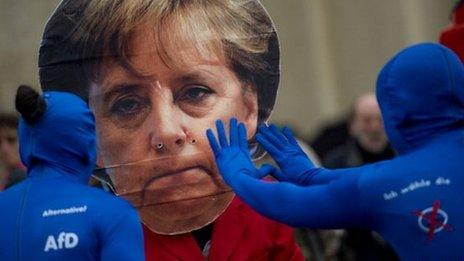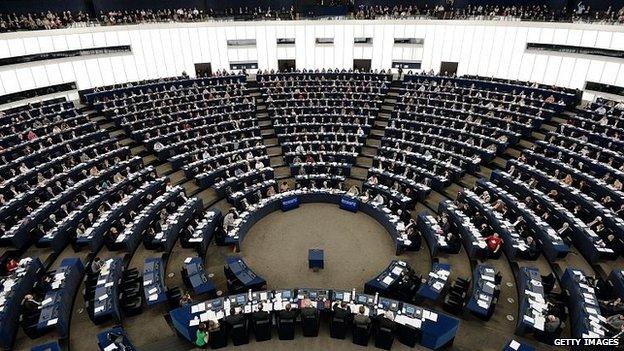German anti-euro AfD party wins seats in east
- Published

AfD leader Bernd Lucke (C, right) says voters want political "renewal"
A conservative German anti-euro party, Alternative for Germany (AfD), has won seats in two more regional parliaments.
Local elections in eastern Germany on Sunday gave the AfD 12.2% in Brandenburg and 10.6% in Thuringia.
The party entered a regional parliament for the first time two weeks ago in Saxony - another eastern German state.
The AfD is mounting a growing challenge to Chancellor Angela Merkel's Christian Democrats. It wants to scrap the euro and sees law and order as a priority.
The party is attracting right-wing supporters, while avoiding links with nationalist extremists.
The Social Democrats (SPD) won in Brandenburg with 32% and are set to remain in power in coalition with the socialist Die Linke who polled 18.9%.
The Christian Democrats (CDU), polled 33.5% in Thuringia, only a few points ahead of Die Linke, who won 28% of the vote.
Until now, the CDU has been in coalition with the SPD in Thuringia but could lose the state to Die Linke if the Social Democrats switch allegiances.
The staunchly pro-euro CDU refuses to form any coalition with the AfD.
The AfD was among many Eurosceptic parties which made large gains in the European elections in May.
The AfD, founded just over a year ago, has seven seats now in the European Parliament. Its MEPs sit in the same grouping as the UK Conservatives, demanding fundamental reform of the EU.
The party campaigns against bailouts for southern European countries, angry that taxpayers' money has been used to save the euro.
"We are the force that's renewing the political landscape," said AfD leader Bernd Lucke, 52, an economics professor.
"One can't deny it anymore: the citizens are thirsting for political change," he said.
- Published12 May 2014

- Published3 June 2014

- Published7 May 2014